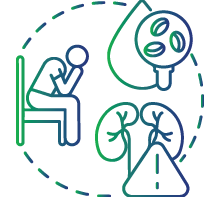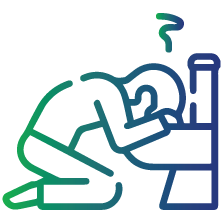
Lipase (LPS) Test
What is Lipase (LPS) Test
A lipase test measures the level of lipase in the blood. Lipase is an enzyme (protein), which helps in the digestion of lipids (fats). It is produced by the pancreas (present behind the lower part of the stomach). A small amount of lipase is also present in saliva. A higher level of lipase in the blood is an indication of pancreatitis (inflammation of the pancreas) and blockage in the pancreatic duct. Thus, getting your lipase tested is recommended to screen and monitor the abnormal functioning of the pancreas.
Lipase test is also known as LPS Test, Serum Lipase Test, Blood Lipase Test.
What is an LPS test used for?
LPS test is used in the diagnosis of:

Pancreatitis

Cystic fibrosis

Crohn’s disease (disease of the digestive tract)

Celiac disease (gluten-allergy)

Gall bladder inflammation

Peritonitis (inflammation of the inner abdominal wall)

Chronic Kidney disease

Effectiveness in pancreatic disorders

Pancreatic cancer
Who should get tested?
LPS test is recommended to be performed frequently for individuals with the following symptoms and risk factors:

Fever

Abdominal pain

Nausea or vomiting

Jaundice

Swollen (inflamed) stomach

Unexplained weight loss

Fatigue

Increased pulse rate

Smoking cigarettes

Alcohol consumption
Test Preparation
Fasting for 10 to 12 hours is required before the LPS test. During this time, only water can be consumed. The patient is advised to not drink any beverages in the morning, such as tea, coffee, or milk, until the sample collection is completed. Make sure to follow specific instructions provided by your healthcare professional before the test.
Interpretation of results
The LPS range may vary according to the age, health history, diagnostic centre, and methodology used.
LPS Reference range in units per litre (U/L).
|
Age |
LPS Normal Range |
|
Adults younger than 60 years |
10 to 140 U/L |
|
Adults older than 60 years |
24 to 151 U/L |
Deviation from normal levels indicates the following:
- LPS test is used by healthcare providers to help diagnose and monitor various causes of developing pancreatic cancer, chronic kidney diseases, gallbladder inflammation, etc.
- Higher-than-normal levels of LPS may be due to underlying conditions such as:
- Pancreatic diseases like blocked pancreatic duct, and pancreatic cancer
- Chronic kidney disease
- Peptic ulcer
- Diseases of gall balder
- Blockage in the intestine
- Alcohol abuse
- Lower-than-normal levels of LPS may be due to underlying conditions such as:
- Cystic fibrosis
- Chronic pancreatitis
- Certain medications like diuretics ("water pills"), cholesterol medicines, codeine, and birth control pills
FAQs
What is the significance of the LPS test?
The LPS test determines the blood lipase level produced by various tissues in your body. The screening, monitoring, diagnosis, and follow-up of pancreatic diseases as well as other medical conditions can all be done with an LPS blood test.
What are the risks associated with the LPS test?
There are no known risks associated with this test. During a blood test, one may experience minor pain or bruising where the needle was inserted, but most symptoms will subside quickly.
How is LPS test performed?
During this blood test, a healthcare professional will take a small amount of blood from a vein in your arm, using a small needle, which is then collected in a test tube or vial. This process usually completes within a few minutes.
What is the turnaround time (TAT) for the results of an LPS test?
Results of an LPS test are usually available in less than 6 hours based on your health condition at the time of testing.
What further tests I might require if I have an abnormal LPS test result?
The level of your LPS test result will determine what kind of additional tests will be done. Your doctor might identify the cause of elevated LPS levels and discuss it with you. Further tests could consist of:
- Other blood and urine tests
- Amylase test
- Abdominal CT or MRI

